AN/PDR-27 GM Survey Meter
The AN/PDR-27 is described by the Directory of Radiac Equipment (1961/62) as a “portable, watertight, battery-operated instrument that furnishes visual and audible indication, detection and computation of radioactivity data.”
All the models employ two halogen quenched GM tubes: an end window GM, and a small side window GM. The latter is only used when measurements are performed using the two higher scales (0-50 and 0-500 mR/hr). Some models (e.g., Model J) employ a two-compartment probe where both GM tubes are piggy-backed together. Other models have the small higher range GM tube housed inside the case.
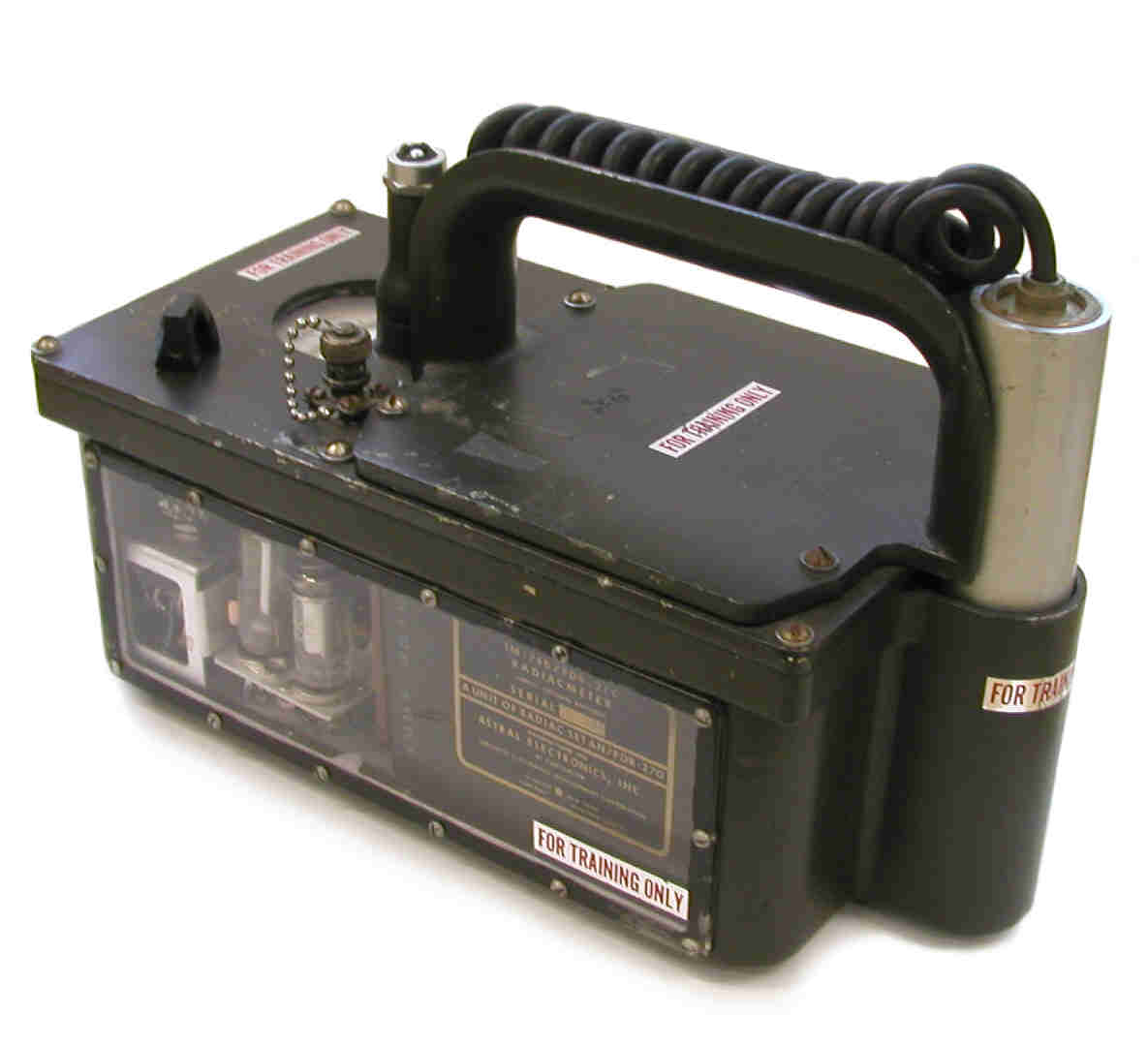
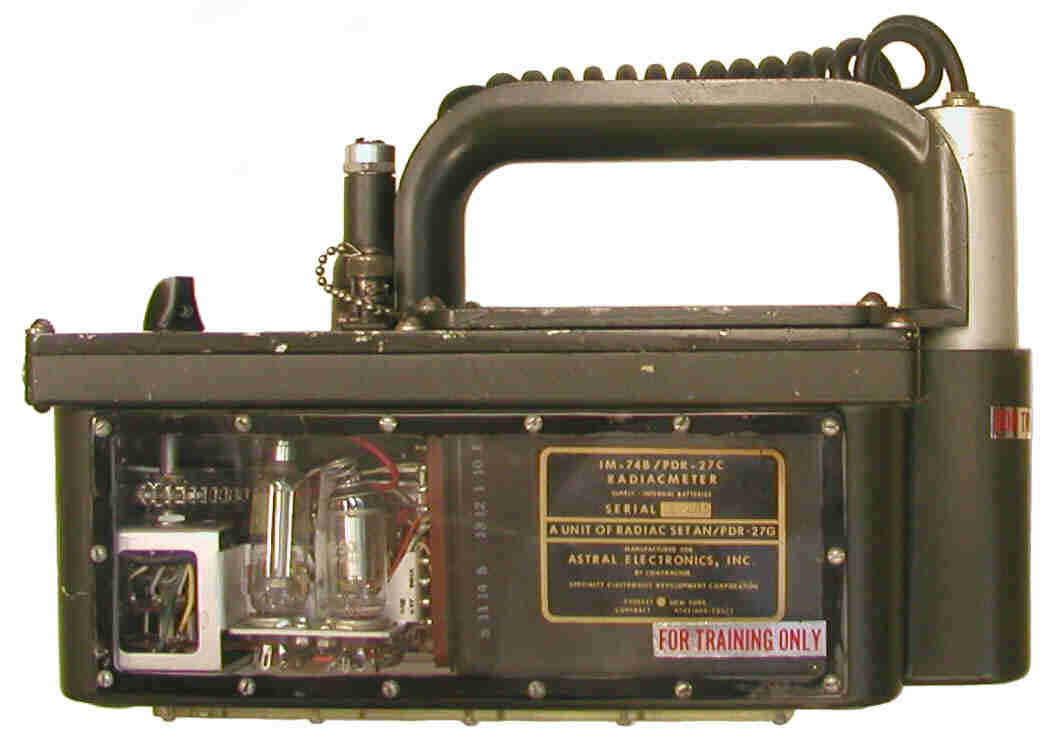
The photographs above show an army IM-74B/PDR-27C (1950s) that has been modified for training purposes. The modifications involve the use of transparent plastic sides and bottom so that the internal components are visible.
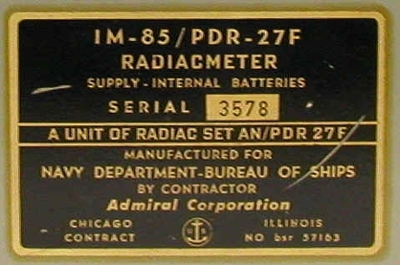
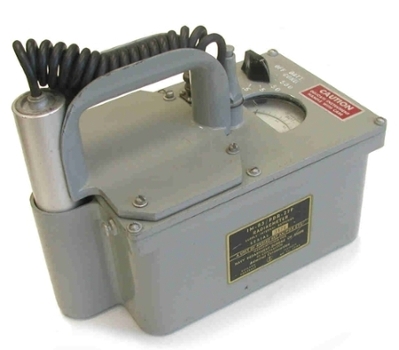
The photographs above show a navy IM-85/PDR-27F manufactured by the Admiral Corporation (1950s-1960s).
The range switch is connected via a chain pulley to a mechanism beneath the meter that changes the visible display. Only the range actually being employed (e.g., 0-5 or 0-50 mR/hr) is seen! In addition, the different scales are given different colors! This greatly reduces the possibility of an incorrect reading. The display is illuminated by pushing the button at the front end of the carrying handle.
Ranges:
- 0-0.5 mR/hr blue
- 0-5.0 mR/hr green
- 0-50 mR/hr white
- 0-500 mR/hr yellow
Audio: Headphones, no speaker
The photo below (from the National Archives) was taken in 1956 at Darmstadt, Germany. It shows Pfc John E. Gankawis of the 517th Medical Clearing Co., using an AN/PDR-27 to test an incoming patient for radioactivitiy before sending him forward to the evacuation hospital, during Operation "Fireball.
| Model A: | Kelley-Koett Instrument Company (contract date:1950, obsolete by 1975) |
| Batteries: Two 1.5 volt, one 22.5 volt and one 135 volt | |
| Model B: | Hoffman Radio Corp. (obsolescent by 1975) |
| Batteries: Two 1.5 volt, one 22.5 volt and one 135 volt | |
| Model C: | Victoreen Instrument Company (contract date: 1956, obsolete by 1975) |
| Size and weight: Approximately 5.75” x 11” x 8,” ten pounds | |
| Model D: | Hoffman Radio Corp. (contract date: 1951, obsolete by 1975) |
| Batteries: Two 1.5 volt, one 22.5 volt and one 135 volt | |
| Four color-coded scales | |
| Size and weight: Approximately 5.25” x 10.5” x 8,” ten pounds | |
| Model E: | (obsolescent by 1975) |
| Size and weight: Approximately 5.25” x 10.5” x 8,” ten pounds | |
| Model F: | Admiral Corp. (contract date: 1952, obsolescent by 1975) |
| Batteries: four 1.345 volt, one 22.5 volt and two 67.5 volt | |
| Four color-coded scales | |
| Size and weight: Approximately 5.75” x 9” x 8,” eight pounds | |
| Model G: | National Electrical Machine Shops (contract date: 1952, obsolescent by 1975) |
| Specialty Electronics Development Corp. (contract date: ca. 1957; obsolescent by 1975) | |
| Size and weight: Approximately 5.25” x 10.5” x 8,” ten pounds | |
| Model H: | Admiral Corp. (contract date: 1953, obsolescent by 1975) |
| Batteries: Four 1.345 volt, one 22.5 volt and two 67.5 volt | |
| Four color-coded scales | |
| Size and weight: Approximately 5.25” x 8” x 8,” eight pounds | |
| Model J: | Chatham Electronics (contract date: 1957) |
| Employs two-compartment probe, i.e., two piggy-backed GMs in single probe | |
| Batteries: Six 1.5 volt “D cells” | |
| Size and weight: Approximately 5.25” x 8” x 8,” eight pounds | |
| Model K: | Admiral Corp. (contract date: 1957) |
| Batteries: Two 1.5 volt, one 22.5 volt and one 135 volt | |
| Model L: | Contract date: No later than 1966; obsolete by 1975 |
| Employs two-compartment probe, i.e., two piggy-backed GMs in single probe | |
| Batteries: Six 1.5 volt “D cells” | |
| Size and weight: Approximately 5.25” x 8” x 8,” eight pounds | |
| Model P: | Contract date: No later than 1966 |
| Employs two-compartment probe, i.e., two piggy-backed GMs in single probe | |
| Batteries: Six 1.5 volt “D cells” | |
| Size and weight: approximately 5.25” x 8” x 8,” eight pounds | |
| Model Q: | Contract date: no later than 1966 |
| Employs two-compartment probe, i.e., two piggy-backed GMs in single probe | |
| Batteries: Six 1.5 volt “D cells” | |
| Model R: | Contract date: No later than 1966 |
| Employs two-compartment probe, i.e., two piggy-backed GMs in single probe | |
| Batteries: Six 1.5 volt “D cells” | |
| Model S: | Contract date: Sometime after than 1966—made for U.S. Navy |
| Employs two-compartment probe, i.e., two piggy-backed GMs in single probe | |
| Batteries: Two 1.5 volt “D cells” | |
| Model T: | Contract date: ?—made for U.S. Air Force |
| Employs two-compartment probe, i.e., two piggy-backed GMs in single probe | |
| Batteries: Two 1.5 volt “D cells” |
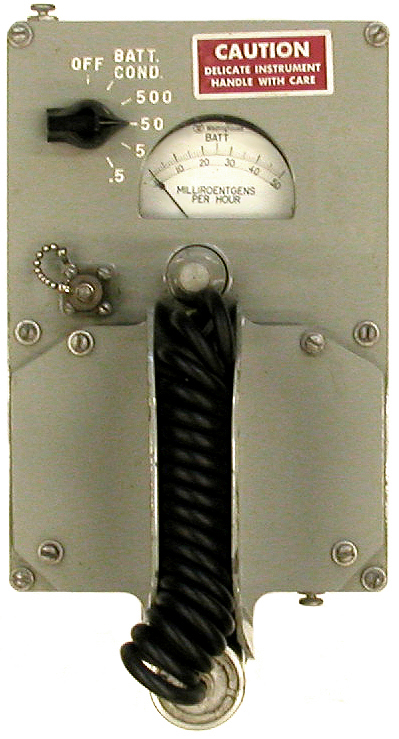
In the military vernacular, “obsolescent” means that an instrument is no longer being procured or maintained but that it may still be used if available. "Obsolete" instruments should not be used.
AN/PDR-27C donated by Ron Kathren.
References
- Directory of Radiac Equipment NAVSHIPS 94200.5, no date, ca. 1961-62.
- Defense Atomic Support Agency, List of Military and Civil Defense Radiac Devices. DASA 1243 revised, 1966.
- Naval Electronic Systems Command List of Radiacs in the Navy Program P-9670-1, February 1975.
- Defense Nuclear Agency List of Military and Civil Defense Radiac Devices HQDNA (AR) 3M Revised, August 1987.
